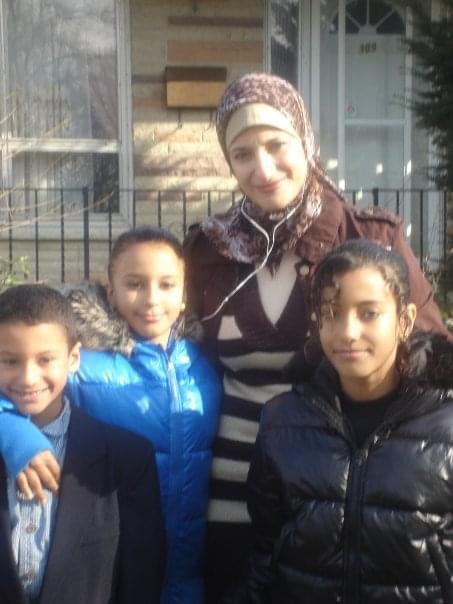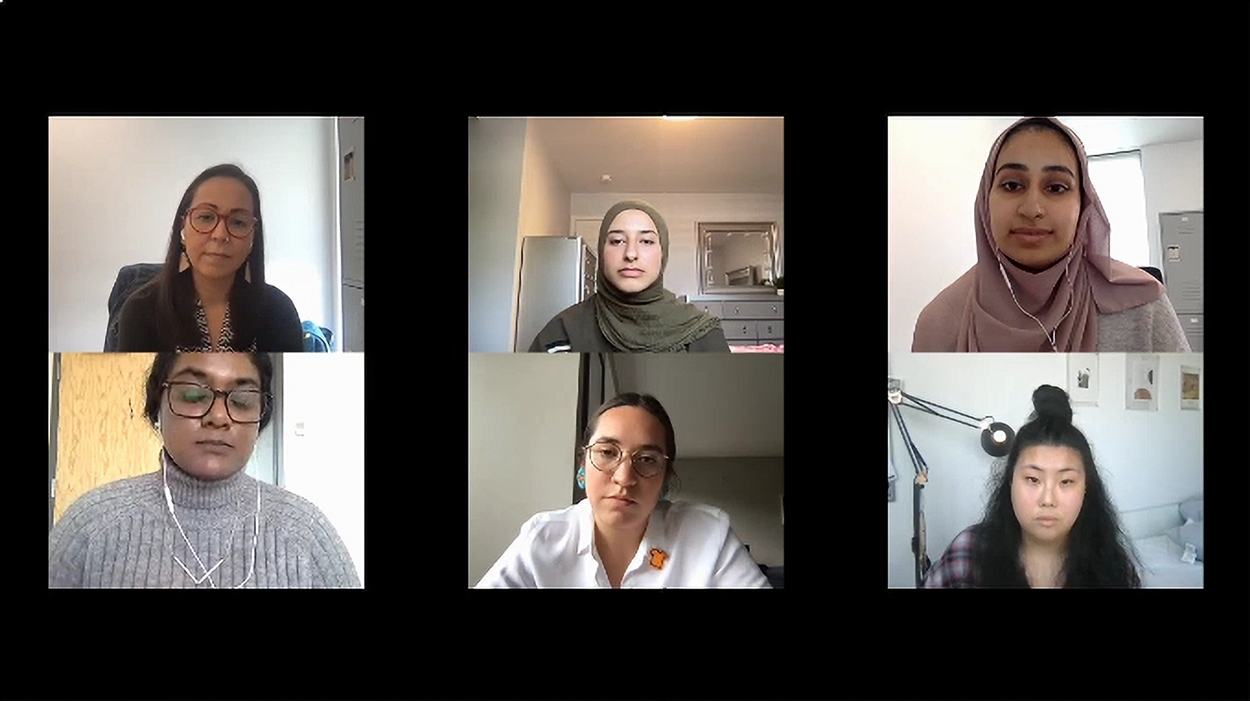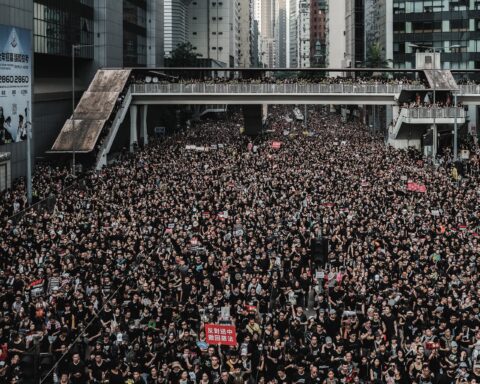Born in Canada, Hafsa Eid went back to Egypt, her mother’s country of origin, when she was four years old.
When the family returned to Canada three years later, she felt a sense of estrangement in an environment with a different language, culture and values.
Starting out as a factory labourer, Eid’s mother worked additional jobs to be able to feed her family, including Eid’s five- and 11-year old brothers as well as her nine-year-old sister.
Eid remembers the toll the work took on her mother and the sadness she and her siblings felt at her absence while she worked to provide for them. At the same time, they understood its necessity and were grateful that their mother never failed to give them the things they wanted.

At 15, Eid decided to get a job in the same factory so she could help contribute to her family’s finances. There, she saw firsthand the way the workers, many of them immigrants, put up with poor working conditions like being called in at all hours because they needed the money to support their families.
“We like to paint this picture of multiculturalism as the Canadian dream,” says Eid. “But we’re the ones who are put into these low-level jobs, who are working to reinforce the status quo, because we’re the ones who are willing to put in the work to try to ascend our social status.”
A fourth-year University of Toronto student and political science major, Eid shared her story along with other immigrant and Indigenous youth at a workshop during the recent fourth annual Metropolis conference on the benefits and drawbacks of multiculturalism policy in Canada.
“In theory, to me, multiculturalism is ideal and holds great potential for Canadian society,” says Eid. “However, when I see it in practice, multiculturalism is merely a tool that the Canadian government uses to mask the history of colonization, slavery and the ongoing systemic racism in all avenues in society.”
Multiculturalism over the years
In his maiden speech to the Senate in 1964, Paul Yuzyk, son of Ukrainian immigrants, called for multiculturalism as a more inclusive Canadian identity that recognized the changing demographics caused by large-scale immigration. In 1971, Canada became the first country in the world to adopt this policy.
On the 50th anniversary of multiculturalism, keynote speaker at the Metropolis conference, Jean Augustine, former Member of Parliament and minister of multiculturalism, noted that multiculturalism has persisted despite its critics, and that “there is no other definition for who we are as Canadians.”
And according to fellow presenter Senator Donna Dasko, public opinion surveys in 2002 showed that three quarters of Canadians saw multiculturalism as promoting greater understanding and equal opportunities among groups in Canada, and two thirds felt it enhanced national unity.
Yet, the prevailing view of the youth at the Metropolis panel was that while multiculturalism might outwardly aspire to inclusion, it, in fact, both masks and perpetuates inequities for minority groups.
Barriers to employment
Eid has experienced similar barriers to employment as her mother, with many positions requiring specific educational experiences or being linked to having a certain name or status.
“As children of immigrants, you see that the type of work you look for is also low level,” she said, “because you’re not surrounded by parents who have connections to line up jobs for you or show you that there’s more work out there that you can reach for.”
In her view, this cycle will be perpetuated through the generations.
Similarly, Yi Li, a recent University of Toronto graduate who came to Canada from China when she was in kindergarten, says she’s also been denied jobs over email simply because of her name. Employers assume she doesn’t have the required fluency in English and knowledge of Canadian culture.
Li has been asked why she doesn’t get an English name to make her life easier.
“As a Chinese Canadian, you have a choice about how you want to respond to that,” she says.
“But the racism and the discrimination preceded you, so now your decision is how do you work in that system? And when you lose your name, you lose a part of yourself. So, that’s a tough decision to make.”
According to Li, there is a large body of sociological research demonstrating the reality of this type of name-based discrimination.
Excluding Indigenous people
Alexis Bornyk, a Métis International Development Student at the University of Toronto Scarborough, sees multiculturalism as a “promotional tool for policymakers” to help people from other countries come into Canada while leaving Indigenous communities out of the conversation.
“Everyone’s tired of hearing about Indigenous struggles,” she says. “But we continue to have the same struggles because nothing is changing.”
Also having Ukrainian and Russian heritage, Bornyk enjoys being able to be part of all these communities within one country and sharing stories and knowledge with people of diverse backgrounds.
But she says conflict can arise when immigrants coming to a place of safety don’t understand the history and current reality of Indigenous people living in precarious conditions.
In Bornyk’s view, it’s critical that education about Canada’s history of colonization and its ongoing effects is made accessible to all immigrants, and that opportunities are created for immigrants and Indigenous people to come together and learn from each other.
Revising multiculturalism policy
According to Eid, it’s critical that people with lived experience are at the forefront of policy decisions which affect diverse communities.
Bornyk says all communities need to be included in the notion of multiculturalism, with more appreciation for community-based living as well as revised education for youth.
Eid seconds the idea of collaboration with communities outside one’s own.
“It’s our responsibility to build those bridges,” she says, “so that we can benefit society as a whole, not just the privileged few.”
This article was written as part of the ‘NCM – Village Media Advanced Training and Mentorship for Immigrant Journalists’ special project.
Daniela Cohen is a freelance journalist and writer of South African origin currently based in Vancouver, B.C. Her work has been published in the Canadian Immigrant, The/La Source Newspaper, the African blog, ZEKE magazine, eJewish Philanthropy, and Living Hyphen. Daniela's particular areas of interest are migration, justice, equity, diversity and inclusion. She is also the co-founder of Identity Pages, a youth writing mentorship program.






Many Canadians are commenting on this article in other news media where it has been copied. Those comments I find quite disgusting and vile – but those other news sites will not allow an immigrant to post an opposing view because it breaks the house rules. A typical comment from a Canadian is “So tired of the whining and trashing of our amazing country by those that have been given the privilege of being here.” That comment was made on MSN https://www.msn.com/en-ca/news/other/multiculturalism-in-practice-remains-barrier-to-full-youth-integration/ar-AAQc1Eh?ocid=msedgntp#comments
Let me respond to that. Many immigrants come from very successful countries with very successful careers after Canadian Government, Embassies, Consulates, Officials, Immigration Lawyers promised diversity, equity, inclusion, and a multi-cultural society that would permit us to equal or even better our lives and our careers. Most of us would not have immigrated to Canada had we known that was not true. When an immigrant discovers there is no diversity, equity, inclusion, nor a multi-cultural society and they are only permitted to do non-skilled work Canada is no longer an amazing country nor is it a privilege to be in Canada. They have every right to trash because everything they were told to encourage them to come to Canada was trash.